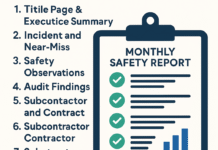
HSE Legal Compliance Register: Ensuring Safety and Adherence
In today’s ever-evolving regulatory landscape, businesses face stringent Health, Safety, and Environmental (HSE) compliance requirements. Among the essential tools aiding companies in navigating this complex terrain is the HSE Legal Compliance Register.
I. Introduction to HSE Legal Compliance Registers
HSE Legal Compliance Registers serve as comprehensive repositories, documenting and organizing the myriad legal obligations that businesses must adhere to concerning health, safety, and environmental regulations. These registers encompass diverse elements, ranging from local statutes to international standards.
II. Importance of HSE Legal Compliance Registers
Maintaining an up-to-date HSE Legal Compliance Register is not merely a legal necessity but a strategic asset for companies. It ensures adherence to regulations, minimizes risks, fosters a culture of safety, and safeguards the reputation of the organization.
III. Components of an HSE Legal Compliance Register
A. Regulatory Requirements
The register includes a meticulous breakdown of applicable laws, regulations, and standards pertinent to the industry and geographical locations where the company operates.
B. Documentation and Record-Keeping
Central to the register is the meticulous documentation of compliance-related records, facilitating easy access during audits and ensuring transparency in operations.
C. Monitoring and Reporting Procedures
It outlines the procedures for ongoing monitoring, periodic assessments, and reporting mechanisms, enabling timely action and rectification of non-compliances.
IV. Creating an Effective HSE Legal Compliance Register
A. Assessing Regulatory Landscape
Thorough research and analysis of existing and upcoming regulations provide the foundation for an effective register.
B. Establishing Documentation Protocols
Implementing standardized documentation practices ensures accuracy, consistency, and accessibility of compliance-related information.
C. Implementing Monitoring Systems
Integration of robust monitoring systems enables real-time tracking of compliance status, fostering proactive measures.
V. Maintaining and Updating HSE Legal Compliance Registers
A. Regular Audits and Reviews
Scheduled audits and periodic reviews ensure the register’s accuracy and relevance in the face of evolving regulations.
B. Adapting to Regulatory Changes
Flexibility to adapt the register promptly to regulatory changes is crucial to staying compliant.
C. Staff Training and Awareness
Continuous training and awareness programs among employees ensure a culture of compliance and accountability.
VI. Benefits of Implementing HSE Legal Compliance Registers
A meticulously maintained register not only ensures legal adherence but also enhances operational efficiency, minimizes incidents, and boosts stakeholder trust.
VII. Challenges and Solutions in Managing HSE Legal Compliance Registers
Despite their significance, challenges in managing these registers exist, including the complexity of regulatory frameworks. Solutions involve leveraging technology, expert consultation, and dedicated compliance teams.
A Health, Safety, and Environment (HSE) Legal Compliance Register is a document that lists and tracks the various laws, regulations, standards, and requirements related to health, safety, and environmental matters that a company must comply with. It serves as a comprehensive record of applicable legal obligations, helping organizations ensure they meet all necessary legal standards and avoid potential risks or penalties.The register typically includes:
- Laws and Regulations: Identification of specific laws, regulations, and statutes relevant to health, safety, and environmental concerns applicable to the industry or region.
- Compliance Status: A record of whether the company is in compliance with each requirement, including dates of compliance checks, reviews, or audits.
- Responsibilities: Allocation of responsibilities to individuals or departments within the organization to ensure compliance with specific regulations.
- Documentation: References to relevant documents, procedures, or policies that demonstrate compliance with each requirement.
- Updates and Changes: A system for tracking any updates, amendments, or changes in regulations and ensuring the register stays current.
- Audit Trail: Documentation of audits, inspections, or assessments carried out to verify compliance.
Maintaining an HSE Legal Compliance Register is crucial for organizations to manage risks effectively, prevent legal issues, and uphold high standards of health, safety, and environmental practices in their operations. Regular reviews and updates are necessary to ensure ongoing compliance with changing laws and regulations.VIII. Case Studies: Successful Implementation Stories
Illustrative case studies highlight how companies have reaped substantial benefits by effectively implementing HSE Legal Compliance Registers.
IX. Conclusion
In a regulatory environment where compliance is non-negotiable, HSE Legal Compliance Registers serve as indispensable tools. Their implementation not only ensures legal adherence but also fosters a culture of safety, efficiency, and trust.
HSE Legal and Other Requirements
HSE LEGAL Compliance Documents
How to Write Standard Operating Procedure
FAQs
1. How often should an HSE Legal Compliance Register be updated?
Regular updates are essential, preferably aligned with regulatory changes and at least annually, to ensure accuracy and relevance.
2. Is it necessary for small businesses to maintain these registers?
Absolutely. Irrespective of size, all businesses need to comply with HSE regulations, making these registers essential.
3. Can software assist in managing HSE Legal Compliance Registers?
Certainly. Specialized software simplifies the process by centralizing data, automating alerts, and streamlining compliance tasks.
4. How can a company ensure employee engagement in compliance efforts?
Employee training, clear communication, and fostering a culture of accountability and safety contribute significantly to engagement.
5. What happens if a company fails to comply with HSE regulations?
Non-compliance can lead to legal penalties, reputation damage, and operational disruptions, emphasizing the importance of adherence.
























